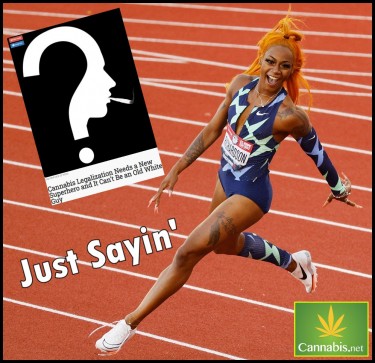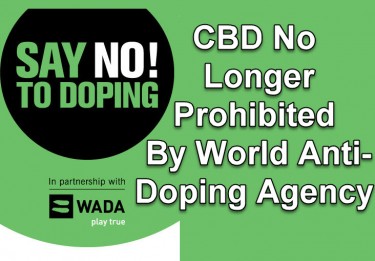
Why the World Anti-Doping Agency is rethinking its ban on cannabis for athletes
Sha’Carri Richardson’s 30-day ban was the torch the world needed to spark a new wave of criticism of current drug laws at international sports competitions.
The World Anti-Doping Agency has announced that, following a series of inquiries from the agency’s stakeholders, it has decided to review its cannabis policy.
Following the mandatory drug tests conducted by all athletes qualified to compete in the Olympics, Richardson was banned from participating because she tested positive for cannabis. That disqualification came a few days before the Olympic events and a few weeks after Richardson made himself popular with millions of Americans and women around the world by running one of the fastest times ever seen in a track race.
Announcement from WADA
The agency’s president, Witold Banka, is delighted with the development. After a crucial meeting a few days ago, Witold said the decisions made would further improve the anti-doping program around the world. He also assured that the agency is focused on protecting clean sporting events.
He added that the committee had made some decisions about drug compliance by athletes, the highly anticipated 2022 Prohibited List, and a few other science-related issues.
What is very clear for now is that cannabis will remain banned for the next sports season until the experiments and trials with cannabis are completed.
Prohibition of drugs in sports
Since the beginning of international sport, some drugs have been banned because they increase the concentration, endurance and speed of athletes. Some of these drugs also cause an increase in muscle mass, strength, and overall performance in the athlete. All these additions to a drug do not correspond to the spirit of sport. However, by the late 1900s, athletes and their managers were able to bypass these tests.
The doping scandal in 1999 led to the establishment of the World Anti-Doping Agency. This was the stakeholder’s tool to ensure that athletes in national and international sports competitions strictly adhere to anti-doping regulations.
Popular drugs that have been banned by the agency include cannabinoids, narcotic stimulants, diuretics, peptide hormones, blood doping, and androgens.
Every year on October 1st, the World Anti-Doping Agency publishes an updated list of prohibited substances in preparation for a new season in various sports.
A memo was released earlier this year that all athletes are not allowed to consume beer, carbonated drinks, and other soft drinks before undergoing their routine drug tests. According to speculation, the authority suspects foul play with the consumption of these substances before the tests.
Cannabis ban by the World Anti-Doping Agency
Cannabis was added to the list of prohibited substances in 2004. It is important to note, however, that cannabis was illegal in almost every country in the world at the time.
When listed along with other banned substances, many people argued that it was a false assumption to qualify cannabis as a performance enhancer. This is due to the fact that marijuana slows down the user.
The late Robin Williams, popular for his comedy events, once joked that the only way weed can improve an athlete’s performance is to have a large Hershey bar waiting for the athlete at the end of the event.
Over the years, popular athletes have been punished for consuming cannabis or even being seen with cannabis.
Michael Phelps was suspended from competing for three months in 2009 after a series of photos leaked showing him smoking weed. In addition to the ban, he lost his sponsorship with Kellogg’s brand.
Another popular athlete is John Capel. The U.S. sprinter was banned from all competitions for two years after testing positive for cannabis in 2006.
Ms. Richardson is the youngest on the list of penalized athletes who have used cannabis or tested positive for cannabis on a drug test.
Review of the cannabis ban
The proposed process of checking the status of a marijuana drug at international events will begin next year. This begins with a scientific review of marijuana to determine whether or not it can improve an athlete’s performance.
Cannabis is experimented with to see if it meets any of the three criteria used to qualify banned substances.
The three criteria are:
-
Increased performance of athletes
-
Violation of the sporting spirit
-
Posing as a health hazard for athletes
If during tests the drug is found to have any of the above characteristics, it will remain banned by the World Anti-Doping Agency.
This is not the first time the agency has been asked to review the cannabis ban status.
WADA defended their list in 2011, citing a study that found cannabis can reduce anxiety in users. The agency claimed that the drug could improve the mental health of cannabis before competitions, helping them perform better than they originally would under severe pressure and stress. WADA used these findings to ensure that cannabis was banned from sports competitions.
Countries that have decriminalized cannabis have argued that these results are inconsistent, as marijuana use also reduces athlete performance.
In 2013, after several backlashes, the agency reduced the length of prison sentences for athletes who tested positive for cannabis.
The United States’ participation in the proposed review
Watchdogs have said the agency’s rethink comes soon after U.S. President Joe Biden comes to the drug ban system.
Shortly after Richardson was disqualified from the Tokyo 2021 Olympics, WADA came under fire from several cannabis advocates around the world, particularly America. President Biden also said that while he is not arguing that rules should be considered rules, he does believe that the rule can be reviewed to see if it should remain the rule.
This can also be described as ironic, as the same President Biden who moved for a cannabis ban review refused to take steps to make cannabis federally legal in America.
Bring away
This time next year, the future of the cannabis ban will be clearer. For the time being, fingers crossed whether the ban will be relaxed sooner or later.
ATHLETES AND CANNABIS, READ THIS …

DID A FAILED DRUG TEST ONLY CREATE THE NEW FACE OF CANNABIS LEGALIZATION?
OR..

WORLD DOPING AGENCY ALLOWS CBD FOR SPORTS!

Post a comment: